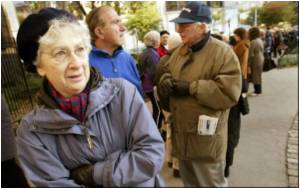
Caregivers view elderly consumers as "old" when they can no longer perform everyday consumption activities on their own regardless of their actual age, according to a new study in the Journal of Consumer Research. "Consumption activities such as shopping, preparing meals, doing housework, going to the doctor, taking medications, and managing money serve as a means of identifying someone as old and a venue for working through conflicts that arise when older consumers who do not identify as old are treated as an 'old person' by family members and service providers," write authors Michelle Barnhart (Oregon State University) and Lisa Peñaloza (Bordeaux Management School).
The authors conducted in-depth interviews with consumers in their late 80s, their family members, and paid caregivers. When older consumers didn't accept being treated like an old person, they negotiated their identity with caregivers through consumption activities. Sometimes they attempted to convince through verbal arguments or prove that they are not old by performing an activity independently. Another strategy was to force caregivers to perform joint activities in a way that the older person was no longer treated as old. And one final strategy was to covertly exclude younger caregivers from an activity. For instance, some of the older consumers hid their driving when caregivers had previously indicated that they believed the older person could no longer drive safely.
"Friends and family members who provide assistance to older consumers should consider the ways they treat them as unaware, confused, dependent, at-risk, or any of the other devalued characteristics that American society commonly associates with old people. By treating older people as valued adults, they can provide needed assistance while decreasing their chances of generating conflict by threatening the older consumer's identity," the authors conclude.
Source-Eurekalert










